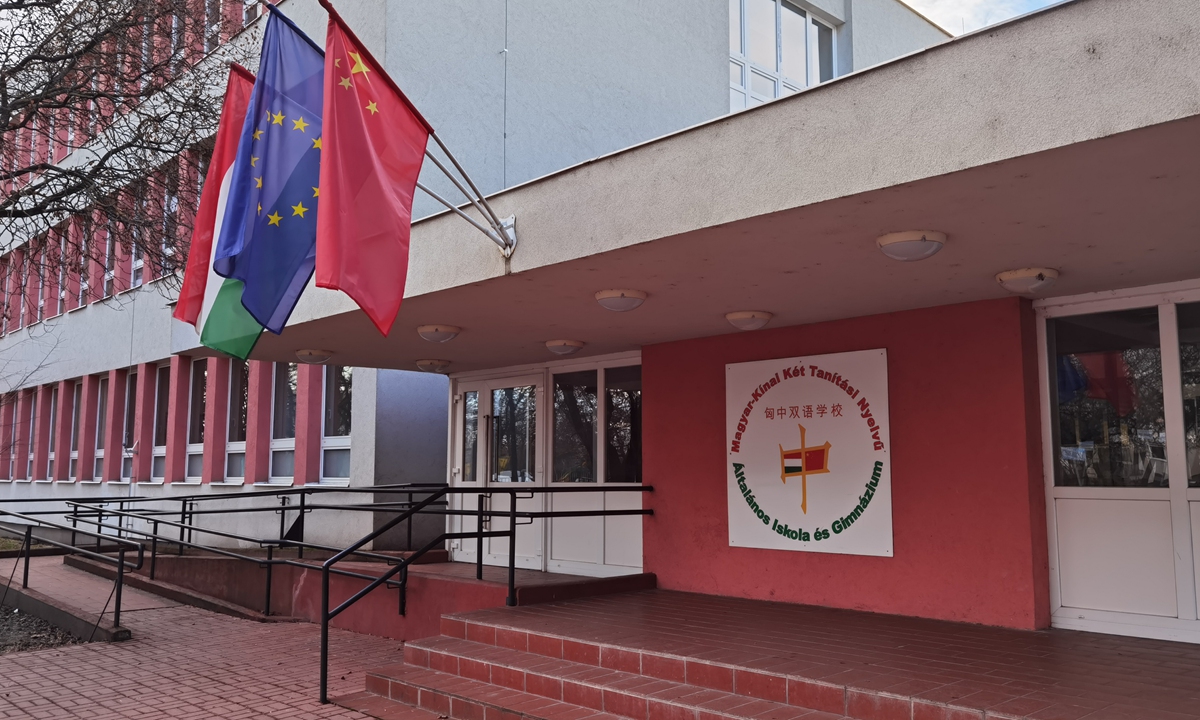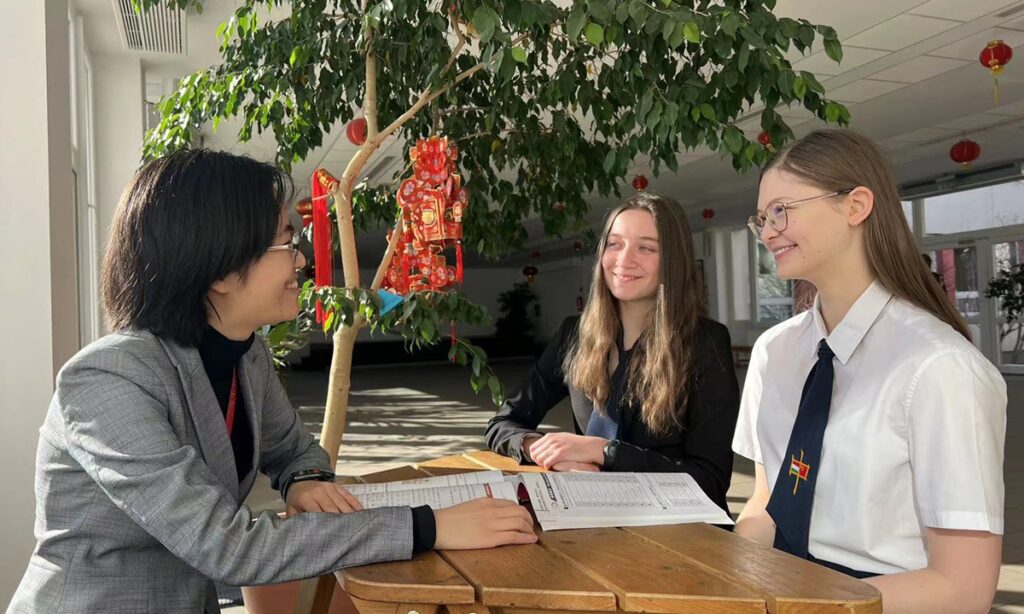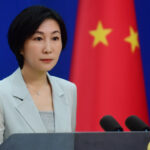Words of warmth
Chinese people believe that letters are as valuable as gold. For thousands of years, letters, across mountains and oceans, have been delivering writers’ sentiments and conveying friendship and expectations.
Xi Jinping, general secretary of the Communist Party of China (CPC) Central Committee and Chinese president, has managed to find time to reply to some letters from different parts of society and the world despite his busy work schedule.
Through his letters, Xi has corresponded with international friends from all walks of life on numerous occasions, part of a series of excellent stories of China’s international exchanges in the new era. The letters have also added vivid color to the diplomacy between China and other countries.
The Global Times traced and contacted some of the recipients of Xi’s letters, to hear the inspiring stories behind the letters and their communication with the president.
In this installment, we talked with teachers and students from a bilingual school in Budapest, Hungary, after they recently received a reply letter from the Chinese president, who encouraged Hungarian youth to learn more about China and become envoys of friendship.
Wang Yue, a Chinese teacher in the Confucius Classroom of the Hungarian-Chinese bilingual school, shares joy with Hungarian students Imre Tamara Lili and Varga Bonita on receiving a reply letter from President Xi. Photo: Yu Yang/GT
Red lanterns, window grilles, couplets, and other festoons… in recent days, the Hungarian-Chinese Bilingual Elementary School in Budapest was immersed in the joyful atmosphere of the Spring Festival to welcome the Year of the Rabbit.
Recently, students and teachers in the school received a reply letter from Chinese President Xi Jinping.
The school, which is located in central Budapest, has proudly been the only full-time public school in Central and Eastern Europe to integrate Chinese alongside the local language in the learning curriculum.
In the letter, Xi said he and his wife were glad to hear from the Hungarian students during the Spring Festival of the Year of the Rabbit, and he still remembers chatting with teachers and students of the school in 2009.
Xi said he would like to give the students a thumbs-up upon hearing that the students have kept learning Chinese for a long time and are committed to making contributions to the China-Hungary friendship.
Following the letter, the Global Times reporters visited and talked with the students in Budapest to learn about the story behind the letter exchanges.
Pleasantly surprising letter
In his letter, Xi emphasized that both China and Hungary have long histories and splendid cultures, and the people of the two countries enjoy a traditional friendship and increasingly close cultural exchanges.
The students, Xi said, are welcome to study in Chinese universities after graduation from high school, hoping that more and more Hungarian youths will love and study the Chinese language.
Xi also said that he hoped they have the opportunity to travel around the country, learn more about today’s China as well as its history and culture, and strive to become envoys to carry forward and develop the China-Hungary friendship.
“As the Chinese New Year approached, we wished to express our gratitude to China, the Chinese government, and all the Chinese teachers and friends who support us in learning Chinese,” said Imre Tamara Lili and Varga Bonita.
Before the Spring Festival, the two students wrote a letter to President Xi and his wife, Professor Peng Liyuan, on behalf of all students in the school, conveying their New Year’s greetings. In their letter, they also spoke about how it felt to study Chinese in the school for 12 years, and expressed their willingness to study in Chinese universities and contribute to Hungary-China friendship.
“President Xi must be very busy during Spring Festival. I did not expect to receive a reply so soon. It was such a surprise!”
The two 19-year-old students also go by the Chinese names Song Zhixiao and Hu Lingyue, respectively. They speak fluent Chinese and have won several awards in Chinese language competitions in Hungary.
Founded in September 2004, the Hungarian-Chinese bilingual school now has 12 grades and 20 classes with more than 530 students.
During his visit to Hungary in 2009, Xi, who was then China’s vice president, visited the school.

Hungarian-Chinese Bilingual Elementary School in Budapest Photo: Yu Yang/GT
Popular Chinese learning in Hungary
On the desk of Erdélyi Zsuzsanna, headmaster of the Hungarian-Chinese Bilingual Elementary School, there is a precious photo of Xi’s visit to the school in 2009.
Erdélyi still remembers that visit vividly: It was late autumn and the weather in Hungary was very cold.
Xi encouraged the school to focus on the future, lay a solid foundation, and cultivate more successors for the cause of the China-Hungary friendship, Erdélyi recalled.
In this recent reply letter, Xi praised the students who insist on learning Chinese and are determined to contribute to the China-Hungary friendship, Erdélyi said.
This reply letter is like the warm sun in winter, which brings the Hungarian Chinese language education community a deep sense of warmth.
Wang Yue, who is a Chinese teacher in the Confucius Classroom of the Hungarian-Chinese bilingual school, said “President Xi’s reply letter made all our Chinese teachers very excited.” The teachers have also shown the letter to the students in class, after which the students vowed to further strengthen their Chinese language skills to live up to Xi’s encouraging expectations.
Every year, graduates from the Hungarian-Chinese bilingual school are enrolled in some of China’s most prestigious institutions of higher learning including Peking University and Tsinghua University, among others, for further studies.
The Chinese language has been popular in Hungary for a while. Chinese is included in the Hungarian national education system, and students can choose Chinese as their first examinable foreign language in elementary and middle schools.
Currently, there are five Confucius Institutes in Hungary, which have trained a large number of Chinese language professionals.
“This letter of reply is not only an affirmation of Chinese language teaching in the Hungarian-Chinese bilingual school, but also an affirmation of the cultural exchanges and cooperation between the two countries,” Zombory Klára, president of the Hungarian-Chinese Friendship Association, said.
“More and more Hungarians are learning about the charms of traditional Chinese culture. At the same time, more and more Chinese people come to Hungary to work, study, or travel,” she said, adding that Hungarian poet Sandor Petofi and architect László Hudec are also widely praised in China and have become Hungarian cultural icons .
Cultural exchanges promote mutual understanding
In recent years, ever-deepening people-to-people exchanges between China and Hungary have become a highlight in the cooperation and communication between the two countries.
Lengyel Bence is a Hungarian student who has been studying in China for four years and is currently studying for a master’s degree at Renmin University of China in Beijing.
Since 2022, he has been running a channel called “Tianyu in China” on social media platforms, documenting and sharing his experiences in China from the perspective of a Hungarian student, which has been widely praised by Hungarian netizens.
“I saw many friends are reposting the news report about President Xi’s reply letter,” he said. “As a participant in the cultural exchange between Hungary and China, I am also encouraged. Young people are the future of the long-standing friendship, and we can enhance it in various ways. The mutual understanding between the people of the two countries will continue to pass on the friendship between Hungary and China.”
According to the Chinese Embassy in Hungary, China and Hungary currently provide about 220 scholarships to each other every year to encourage student exchanges that allow young people from the two sides to study in each other’s countries.
Yang Chao, interim charge d’affaires at the Chinese Embassy in Hungary, said that the reply letter fully demonstrates that President Xi attaches great importance to strengthening people-to-people and cultural exchanges between China and other countries, promoting people-to-people bonds, and promoting mutual understanding among civilizations from the perspective of building a community with a shared future for mankind.
“The friendship between the two countries lies in the friendship between the peoples,” Yang said. The relationship between the two countries needs the support of the people and will ultimately serve the people,” he said.
“The better the people of China and Hungary understand each other and visit each other, the stronger the foundation of the friendship between the two countries and the more prosperous the practical cooperation will be,” he noted.
After China optimized its virus prevention policies, cultural exchanges between China and Hungary will usher in new opportunities.
China has started a pilot program allowing national travel agencies and online travel companies to resume the outbound group tours for Chinese citizens.
Hungary is among the first 20 countries to open up to the pilot program. At present, the three direct flights between the two countries have been fully restored.
Zoltán Guller, chairman of the Board of the Hungarian Tourism Agency, said that “Hungary is very much looking forward to the arrival of Chinese tourists, and we are full of expectations for deepening cultural exchanges and cooperation between the two countries.”
(Global Times)




